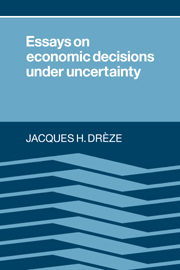Book contents
- Frontmatter
- Contents
- Acknowledgements
- Foreword
- I Decision-making under uncertainty: general theory
- II Markets and prices
- III Consumer decisions
- IV Producer decisions
- V Theory of the firm
- IV Human capital and labour contracts
- 17 Human capital and risk-bearing
- 18 Some theory of labour management and participation
- VII Public decisions
- Index
18 - Some theory of labour management and participation
Published online by Cambridge University Press: 01 October 2009
- Frontmatter
- Contents
- Acknowledgements
- Foreword
- I Decision-making under uncertainty: general theory
- II Markets and prices
- III Consumer decisions
- IV Producer decisions
- V Theory of the firm
- IV Human capital and labour contracts
- 17 Human capital and risk-bearing
- 18 Some theory of labour management and participation
- VII Public decisions
- Index
Summary
Labour management
One hundred years ago, the first edition of the Eléments d'Economie Politique Pure by Léon Walras was half-way through printing. This anniversary provides special justification for the presentation of a Walras lecture at our congress. It also places a special burden on the author of the lecture to rationalise the choice of his pet-subject through appropriate references to the life and works of Walras. I will in due course provide such rationalisation for my topic, which is the pure theory of labour management and participatory economies.
This topic currently arouses a great deal of interest – at various levels. For some, labour management, or self-management, is a global project of political, social and economic organisation. For others, it is a form of organisation that meets a basic human aspiration and should be fostered wherever possible, through modest as well as ambitious projects. For our purpose here, a labour-managed economy is an economy where production is carried out in firms organised by workers who get together and form collectives or partnerships. These firms hire non-labour inputs, including capital, and sell outputs, under the assumed objective of maximising the welfare of the members, for which a simple proxy is sometimes found in the return (value added) per worker. The capital can be either publicly or privately owned. To permit easier comparison, I will base this presentation on private ownership.
- Type
- Chapter
- Information
- Essays on Economic Decisions under Uncertainty , pp. 366 - 382Publisher: Cambridge University PressPrint publication year: 1987
- 1
- Cited by



